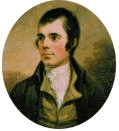BURNS' NIGHT

People from Scotland celebrate Burns' Night on 25 January, the anniversary of the birth of Robert Burns (Scots call him 'Rabbie' Burns), Scotland's great 'national' poet and songwriter. He was born in Alloway, a small village in southern Scotland on January 25 1759. He was the son of a farmer, and was called the Ploughman Poet because he had been a farm worker. The small cottage in Alloway, where he lived, is now a museum. He died in 1796 from rheumatic fever, at the age of 37.
A
traditional Burns Night celebration consists of a large formal
dinner. This ritual was started by close friends of the poet
a few years after his death as a tribute to his memory. The basic format
for the evening still follows the same pattern whether it is held in
formal dining rooms or the local pub. The ceremony begins when the designated
"chairman" of the evening invites "the company"
(guests) to receive the haggis - a traditional Scottish
dish made from a sheep's stomach stuffed with minced heart, liver, suet
(animal fat) and oatmeal (a cereal that is also used to make porridge,
another Scottish food.
Next comes the reciting of a prayer, Selkirk Grace
(written by Burns).
The company are then asked to stand to receive the haggis.
A piper in full traditional Scottish dress and playing the bagpipes
(a musical instrument featuring an air-filled bag fitted with pipes)
leads the chef, carrying the haggis to the top table.
As the ceremony continues, the chairman recites Burns' famous 'Address To A Haggis'. When he reaches the line "an' cut you up wi' ready slight", he slices open the haggis with a sharp knife. It is customary for the company to applaud the chairman and to stand and toast the haggis with a glass of whisky.
The traditional Burns supper menu consists of cock-a-leekie soup (or Scotch broth) and haggis with "tatties and neeps" (mashed potatoes and turnips), all washed down with liberal tots of the "water of life" - Scotch whisky.
One of the central features of the evening is when an invited guest is asked to give a short speech on Burns. known as the Immortal Memory Speech, it can be light-hearted or literary but the aim is to outline the greatness and relevance of the poet today. Various humorous speeches follow.
Once the speeches are complete the evening continues with songs and poems written by Burns. Favourites include Tam O'Shanter, Address To The Unco Guid, To A Mouse, and Holy Willie's Prayer.
The
evening ends with the company standing, linking hands and singing one
of Burns's most famous works, Auld
Lang Syne.

haggis